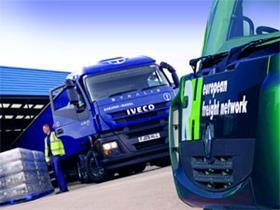
International Swiss-based freight and logistics business Kuehne + Nagel reaped the benefits of its long term growth strategy with record results in the 12 months to 31 December 2011.
Globally, K+N saw net profit rise to CHF606m (£421m) on turnover of CHF19.6bn (£13.6bn), increases of 12.2% and 9% respectively after the effect of the strong appreciation of the Swiss franc against K+N’s major trading currencies was stripped out, according to Tim Scharwath, vice-president for global air logistics.
In K+N’s four main operating areas of seafreight, airfreight, road and rail, and contract logistics, Scharwath says K+N saw volumes grow strongly as a result of maintaining its heavy investment in new services and infrastructure despite generally weak markets which held rates down.
Road and rail volumes were up 19% in a market that grew 5%, while the contract logistics division saw turnover rise 8% in a market that was just 3% up on 2010.
The European road and rail overland business in Germany was a star performer, especially compared with the depressed state of southern Europe, and the acquisitions of RH Freight in the UK and Drude Logistik in Bad Hersfeld in the centre of Germany has boosted this division. Although RH Freight was five times bigger than Drude, the latter was more strategic as its 125,000sq m site will become K+N’s European hub for overland groupage. Scharwath commented that margins were under pressure because fuel and other operating costs had risen faster than rates.
Contract logistics saw good growth in the first half of 2011, but after a slow down in the second half the full year market growth was an historic low. Europe was not immune from this trend, with a “boom” in Germany dented by “disastrous” market conditions in France, Italy, Spain and Greece.
Scharwath says K+N’s focus for 2012 would remain on growing profit rather than chasing turnover and reducing its “risk profile” in contract logistics by reviewing all customer contracts. K+N is on track to achieve its ‘Go fro Growth’ strategy of making a CHF1bn profit by 2014 in all its divisions except contract logistics, where it is forecasting only 3% volume growth for 2012, compared with 8 to 10% in its overland business. The quoted group still has a war chest of over CHF1bn in cash to invest and despite the cost and revenue pressures still managed to increase return on capital to an impressive 56% in 2011.
Focusing on the UK market, Yngve Ruud, president of K+N North West Europe, said it remained a “challenging environment”, with the market declining in the fourth quarter of 2011 and the first quarter of 2012.
Nevertheless, K+N grew its UK business almost 15% last year, with strong performances in sea and airfreight. Its overland road and rail business benefited from a full year of trading from RH Freight, where the successful integration into K+N was completed in January this year.
Since the acquisition, there has been “strong growth from RH Freight customers”, Ruud said.
KN’s UK contract logistics business also outperformed a moribund market, recording a 10% growth is turnover on the back of a couple of good contract wins and organic growth with existing customers through the development of added value services. Rather than taking a scattergun approach, K+N is targeting growing markets where it believes it can make an acceptable margin.
These include food service, where it has now added a long term contract with Spirit Pub Company to the major business secured with Whitbread in 2008. K+N now delivers 31m cases a year of frozen, chilled and ambient products to Whitbread outlets including Premier Inn, Costa Coffee, Brewers Fayre and Beefeater, a 50% increase in four years.
The Spirit deal will add a further 125,000 multi-temperature deliveries a year to its 1,300 owned and leased pubs, making K+N the market leading 3PL in the food service sector with a £50m annual turnover from three multi-temperature DCs at Wellingborough, Trafford Park and Greenford.
John Hartley, head of sales and marketing for K+N in North West Europe, says using a 3PL rather than a traditional wholesaler offers restaurant and pub chains “significant advantages”, including better visibility of costs, dedicated solutions, better service levels, reverse logistics and recycling of waste.
“We foresee further moves from traditional wholesale to 3PL,” he predicted. “We can offer increased transparency of costs and better service with our dedicated approach. We have had a good look at the market and see two or three good opportunities.”
These could include the large contract caterers as well as branded restaurant chains, and while food service will never be as big an opportunity for 3PLs as retail Hartley reckons the market could be worth around £1bn.













